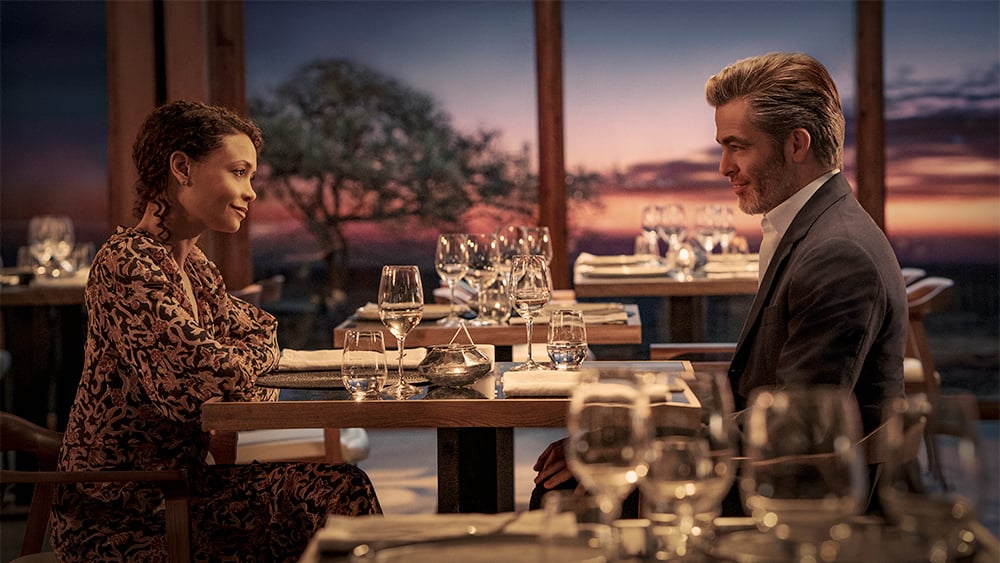The streaming era, with its glut of viewing options and its omnipresent yet thinly spread advertising, often makes it harder for audiences to get an advance read on a movie. When you see that a couple of actors as good as Chris Pine and Thandiwe Newton have teamed up for a spy thriller that’s being released by Amazon Studios, and that it’s called “All the Old Knives” (a title that sounds like it could be about anything or nothing), you wonder — a little more than you might have 30 years ago — if it’s a project that makes good on their talents or whether it’s another ho-hum slab of product. (Ho-hum product has always been with us; but there’s more of it now.)
So I’m glad to report that “All the Old Knives” is a minor but engrossing genre movie: tightly wound, more or less rooted in the real world, with taut dialogue and espionage gambits that fall just this side of contrived. It’s not John le Carré, but it’s not thinly patched together pulp either. Watching “All the Old Knives,” you never forget why Chris Pine and Thandiwe Newton (warning! dated term coming) are movie stars.
The film jumps back and forth between a couple of time periods and settings, and while in some thrillers that kind of thing can be annoying — a way of goosing inert action — in this one, the director, Janus Metz (the former documentarian who made 2017’s “Borg vs. McEnroe”), knows just what he’s doing. The film is based on a novel by Olen Steinhauer, who also wrote the screenplay, and it has a novelistic flavor in the best sense. Instead of simply slamming romance and terrorist politics into one movie, “All the Old Knives” weaves them together into a kind of thriller lanyard.
Pine’s Henry Pelham is a veteran CIA operative, the kind of case agent who wins the trust of his sources with his fluency in their language and his aura of empathy. He is called in by his former boss at the Vienna office (played by Laurence Fishburne with a tone just neutral enough to be untrustworthy) to look into an old case. In 2012, a Turkish airliner was hijacked by jihad terrorists as it sat on the runway of the Vienna airport. The terrorists wound up killing everyone onboard (over 100 people), including themselves. Why did this disaster happen? New evidence suggests that there was a mole in the CIA ranks, and Henry has been ordered to ferret out the betrayer.
In London, he shows up at a pub to surprise Bill Compton (Jonathan Pryce), a former veteran of the Vienna office who phone logs indicate made a mysterious call to Iran the night of the hijacking. That sounds so much like a red flag, and Pryce’s performance is so brimming with flustered mis-attempts to keep his cool, that we immediately suspect he’s too obvious a candidate. (A movie can’t reveal its culprit in the first 10 minutes.)
But could the mole really be the other person Henry has been asked to question with extreme prejudice? That would be Celia Harrison (Newton), who was carrying on a romantic affair with him back when the hijacking happened. She left him — and the Agency — immediately afterward, and is now married with two kids in Carmel-by-the-Sea, California. She and Henry haven’t seen each other for eight years, but he arranges to meet her at an earthy high-end wine-country restaurant for lunch.
Half the film consists of them sitting at a table in the otherwise empty restaurant, sipping wine and eating dishes flecked with items like free-range bacon as the sun gorgeously makes its way toward sunset. It’s an interrogation, a reminiscence laced with flirtation, and a cat-and-mouse game, not to mention the film’s way of sketching in the story, and it all flows like wine because Pine and Newton know how to turn up the sizzle in a slow-burn way, even as they keep us guessing as to who’s zooming who.
Love Film & TV?
Get your daily dose of everything happening in music, film and TV in Australia and abroad.
Pine, for all his aging-glamour-boy indie-hair-band sheen, is an actor who would have done fine in the ’70s. There’s a velvet softness to him, but an edge to his intelligence. He has a sixth sense for seducing you into his point-of-view — for sketching in the options of action he’s facing at any given moment. And Thandiwe Newton rivets us by giving the wiliest performance in the movie. She shows us how Celia could be at once a solemn patriot, a soulful domestic partner, a cold executioner, and a romantic outlaw who had reached the limits of her trust. As Ilyas, the Chechen baker who Henry cultivated as a source (and maybe a friend), only to be ordered by his superiors to sell him out to the Russians, Orli Shuka uses a few short scenes to color in the bitter personalized roots of terrorism.
In flashback, we meet the other members of the Vienna CIA station in 2012, and they’re a convincing crew of cynical office drones. The Carmel restaurant — which is so beautiful you want to go there, at least until you start hearing about the fussy cuisine — is a functional setting that becomes a character in the movie, especially as we’re led to scrutinize the people working at it. I still don’t totally know what the title of “All the Old Knives” means, but I won’t soon forget the look on Chris Pine’s face at the end, as he realizes he’s been living at a crossroads of morality and treachery. Who’s the mole? I wouldn’t tell. But “All the Old Knives” pings off the ways that the shadow world of espionage can make a mockery of doing the right thing.
From Variety US































